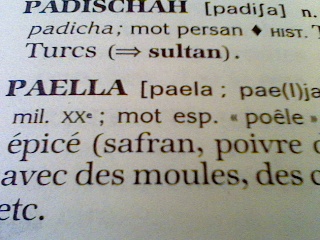I’ve just bought a new webcam, and wanted to test the snapshot utility, so I decided to take a photo of the entry paella in the prestigious French dictionary Le Petit Robert. The reason I have taken a photo of it is because the etymology given is wrong:

According to this dictionary, the word is Spanish and means poele, that is, pan. The word may well have entered French via Spanish, but it certainly doesn’t mean pan in Spanish, in which the word is sartén, although the word paellera has also been adopted to refer to the dish used to cook paella.
The word is originally from Catalan. In the Valencia region, they began cooking rice in shallow pans, referred to in Catalan as a paella. So the dish would have been referred to as arròs a la paella, that is, rice cooked in a shallow pan. Over time, this was shortened simply to paella, and the word was adopted by other languages. In Catalan, you still hear paella referred to simply as arròs (rice) when it is not necessary to specify which rice dish one is referring to.
This correct etymology is given in various other dictionaries, including the Merriam Webster.
In Catalonia, paella is traditionally eaten on a Thursday. I have no idea why, and would love to hear an explanation. I’m also not sure whether this tradition is just in Catalonia or whether it is also followed in the Valencia region and the Balearic Islands, or indeed in other regions of Spain. A former Galician flatmate of mine was unaware of this tradition before moving to Catalonia, so I am assuming it is not a tradition followed throughout Spain.

So you mean to say that the dictionary confused ‘Spanish’ and ‘Catalan’, but still more or less got the meaning right, if not the origin language.
There are some other theories as to the origin of the word, though the one you have is almost certainly correct:
Origin of ‘paella’
Bé, l’explicació tradicional (que no sé fins a quin punt és vigent) a la paella del dijous és aquesta:
Els bars de menús fan menjar per a molta gent. Normalment tenen 2 o 3 primers i 2 o 3 segons, que fan en grans quantitats per poder oferir bons preus.
Els ingredients que sobren un dia, s’aprofiten el dia següent sempre que sigui possible i, com que normalment intenten donar varietat a la clientela fidel, arriba el dijous amb diversos excedents.
La paella és un bon recurs per donar sortida a tots aquests excedents.
Jo havia sentit una altra versió de la tradició de la paella els dijous i crec que s’ajusta més a la realitat que la de Josep Tarrés (sense voler desmerèixer-la).
Les mestresses de les cases riques no solien saber cuinar gaire, per no dir gens. Per cobrir aquesta necessitat, solien comptar amb una cuinera (o més). El servei sempre tenia un dia de festa setmanal, que era el dijous (de fet, a les cases on hi ha servei, aquest continua sent el dia de festa). Ara lliguem caps i pensem algun plat que pugui quedar preparat en vigília i al qual només s’hagi d’afegir aigua per dinar… i dinar bé, és clar.
La minyona deixava el sofregit i l’arròs tot barrejat el dimecres i així l’endemà la senyora de la casa només havia d’afegir aigua bullent 20 minuts a la paella!
Salutacions d’un company traductor :-D